Most events throughout the festival are free and open to the public. However, a few special highlights require tickets, including:
 Super Concerts featuring top regional and international performers
Super Concerts featuring top regional and international performers Alvin Ailey II Dance Company – a world-renowned performance you won’t want to miss
Alvin Ailey II Dance Company – a world-renowned performance you won’t want to miss “Back in Time Fete” – a nostalgic party celebrating Caribbean musical heritage
“Back in Time Fete” – a nostalgic party celebrating Caribbean musical heritage
A complete list of ticketed events and the link to purchase tickets are available here. All prices are listed in Barbados Dollars (BBD).
For ticketing inquiries or to report an issue, please contact:  myticketlinkz@gmail.com
myticketlinkz@gmail.com
Join us in Barbados for an unforgettable cultural experience as we celebrate the spirit, rhythm, and soul of the Caribbean!

“These countries are recognised internationally for the excellence, richness and diversity of their cultural expressions,” stated Ms Harry -Emmanuel.
She added “Directors of Culture have advocated for greater attention to and allocation of resources to the creative sector, resulting in significant changes in the enabling environment in the Region in terms of cultural policy, data collection, training, legislation and funding mechanisms at national and regional levels.”
The RCC has been instrumental in shaping cultural policy at the national and regional levels, by advising Ministers of Culture on the many issues on the Region’s agenda and infusing the regional culture programme with new ideas, new approaches and new attitudes.
Please read Mrs. Harry-Emmanuel’s remarks below.
Remarks by Mrs. Beverly Harry-Emmanuel
Advisor, Social Development
CARICOM Secretariat
Thirty-First Meeting of the Regional Cultural Committee (RCC)
Opening Ceremony
26 June, 2025
- Mrs. Michelle Maynard, Deputy Permanent Secretary, Division of Culture
- Permanent Secretaries and Directors of Culture
- Ms. Carol Roberts, Festival Director
- Members of the Host Country Management Committee
- Members of the Interim Festival Directorate
- Members of Staff of the CARICOM Secretariat
- Members of the Media
It is my pleasure to warmly welcome you to the Thirty-First Meeting of the Regional Cultural Committee (RCC), on behalf of the Secretary-General of CARICOM, Dr. Carla Barnett.
The RCC has an important advisory role to perform, that you and officials who have served before you, have provided for over three decades to CARICOM Ministers of Culture, who meet periodically in the Council for Human and Social Development (COHSOD). This body has done so consistently and is well respected as one that has provided sound expert advice, since its first meeting in 1987 in Trinidad and Tobago.
A very special welcome to the representatives of Member States who are attending the RCC for the first time. It is a pleasure to welcome you into the CARICOM family of Directors of Culture, and I hope you will find participation in the RCC a rewarding experience. A warm welcome also to members of the Interim Festival Directorate, the regional management body for CARIFESTA, who met yesterday with the Host Country Management team to provide their support and expertise in preparations for CARIFESTA.
A very special thank-you to the Government of Barbados for hosting these meetings this week, for the warm hospitality that we have received since our arrival, and the excellent arrangements put in place for the Nineteenth Meeting of the Interim Festival Directorate and the Thirty-First Meeting of the Regional Cultural Committee.
I think it is evident that the international and regional context in which the RCC has been working has changed fundamentally since 1987 when this body first met in Trinidad and Tobago.
There is now significantly increased regional and global awareness of the value and importance of the creative industries, and the ways in which they can contribute to sustainable development in small countries in the global South. These countries are recognized internationally for excellence, richness and diversity of their cultural expressions.
Directors of Culture have advocated for greater attention to and allocation of resources to the creative sector resulting in significant changes in the enabling environment in the region in terms of cultural policy, data collection, training, legislation and funding mechanisms at national and regional levels.
It is with this awareness of the tremendous value of the creative industries to our region that the project “Creative Caribbean: An Ecosystem of ‘Play’ for Growth and Development” was designed by the CARICOM Secretariat, The University of the West Indies and UNESCO, to provide much needed support to creatives in CARICOM. Currently, targeted grant support is being disbursed to 78 creatives and cultural entrepreneurs in 15 countries in the region and the programme is also providing vital resources to develop the enabling environment for the creative sector.
This includes the development of national registries of artists; draft model legislation for Creative Industry Development Acts in Member States to protect and incentivize the sector; development of a model satellite account for data collection and management; and the development of a regional creative content hub to facilitate innovation and creativity. The RCC will receive important updates in relation to the successes of the project to date.
The Caribbean Development Bank’s Creative and Cultural Industries Innovation Fund (CIIF) continues to provide valuable grant support for creative entrepreneurship in the region, for data collection, innovation and job creation. It is welcome news that the Caribbean Development Bank decided to recapitalize and continue the operations of the Creative and Cultural Industries Innovation Fund (CIIF) beyond the initial investment of US$2.6 million which established the fund in 2018, and which facilitated the first cycle of funding that ended in 2023. We look forward to the Creative and Cultural Industries Innovation Fund’s (CIIF) update on this important initiative.
The matter of Reparations for Native Genocide and Enslavement continues to be placed high on the agenda of CARICOM Heads of Government and the region. We continue to pursue reparations from Europe for over 400 years of slavery and colonialism, which has resulted in the systemic underdevelopment of the region and persistent poverty in many communities. The observance by the United Nations of the Second International Decade for People of African Descent (2025-2034) and the declaration by the African Union of 2025 as the year for ‘‘Justice for Africans and People of African Descent Through Reparations” both present valuable platforms for increased advocacy and awareness of the reparations agenda that has been championed by the CARICOM Reparations Commission for 12 years since 2013.
Steps are being taken by our Heads of Government, to form a coalition with the African Union for increased joint advocacy on this important human rights movement for justice and development. Ministries with responsibility for Culture continue to have an important role to play in facilitating public education and dialogue on reparatory justice and enabling the people of the region to reclaim and value aspects of their cultural heritage which were either lost or denigrated through centuries of oppression.
Ladies and gentlemen, I also bring to your attention the important work being undertaken by UNESCO in collaboration with the Caribbean Disaster Emergency Management Agency to build the resilience of the culture sector to disasters and climate change. This work is timely and vital to the preservation of national patrimony. Mitigation and recovery strategies will also be presented for discussion and the guidance of Directors.
However, the priority that will consume the attention of the RCC is preparations for the Fifteenth Caribbean Festival of Arts, scheduled for 22 -31 August 2025 in Barbados. Directors of Culture and Members of the Interim Festival Directorate will engage with the Host Country team on arrangements that are key to a successful event, from artistic concept to logistics, venues, marketing, customs, security, accreditation and accommodation. Barbados is in an advanced stage of preparations for what promises to be a diverse and exciting ten-day event. This is an important opportunity for participating countries to visit venues, scout accommodation and gain a range of information to help finalize their plans for CARIFESTA. The RCC will devote significant time to discussions with Barbados to ensure a successful and enjoyable event.
This Thirty-First Meeting of the RCC provides yet another opportunity for reflection, review and renewal to ensure that national and the regional culture agendas meet the needs of the members of the culture sector who you serve. The RCC has been instrumental in shaping cultural policy at the national and regional levels and infusing the regional culture programme with new ideas, new approaches and new perspectives.
It is a pleasure for me to be here with you, and I take this opportunity to wish us all a productive meeting.
Thank you.
]]>Thursday, 26 June 2025 (CARICOM Secretariat, Turkeyen, Greater Georgetown): The stage is being set in Barbados for a spectacular hosting of CARIFESTA XV which will feature a unique blend of dramatic and cultural performances, fashion, music, dance and art installations.
This will be the third CARIFESTA hosted by Barbados, which previously hosted the festival in 1981 and 2017.
With under two months to go, CARICOM Directors of culture, technical officials and a team from CARICOM Secretariat are in Barbados for the Nineteenth Meeting of the Interim Festival Directorate – IFD (24-26 June) and the Thirty-First Meeting of the Regional Cultural Committee – RCC (25-27 June 2025).
The IFD is the regional management body of CARIFESTA.
The group is getting a first-hand look at the venues, which will showcase a variety of performances and cultural activities, including drama, fashion, music, culinary arts, and spectacular art displays.
The Meeting of the IFD is being co-chaired by Dr Hilary Brown, Programme Manager, Culture at the CARICOM Secretariat, and Festival Director Carol Roberts (CEO, National Cultural Foundation, Barbados).
In her opening remarks during the IFD meeting on Wednesday, Dr Brown underscored the importance of the body, which has been meeting since 2006, to the planning of CARIFESTA.
“This is an important step that we take every time we have CARIFESTA… our delegations are in the host country to interact with the organising team in order to develop a cultural performance that will excite our CARIFESTA audience,” stated Dr Brown.
“The insight and guidance of the IFD are crucial to ensuring that CARIFESTA remains relevant and advantageous for all stakeholders involved,” she emphasised.
She speaks about the importance of the IFD to CARIFESTA XV below.
CARIFESTA XV Festival Director and Chief Executive Officer, National Cultural Foundation, Barbados, Carol Roberts, highlighted that robust discussions with the IFD are significantly beneficial to the CARIFESTA XV Organising Committee. She explained that the committee commenced preparations in 2023 and will utilise the feedback from the IFD to enhance the plans and initiatives for CARIFESTA XV.
“This valuable insight we are utilising to ensure that Barbados as host and the Region as a whole, can deliver an unforgettable CARIFESTA – unforgettable in all the best ways,” underscored the Festival Director.
She explains how the work of the IFD impacts CARIFESTA plans below.
Additional information:
- Dr Brown further explained that the IFD was born from a proposal by artists participating in the CARIFESTA VIII (2003) advocating for a body to ensure better management and visibility of the Festival, as well as more opportunities and development for regional artists.
- The IFD is responsible for reviewing the structure of the festival and ensuring it meets the objectives of the CARIFESTA strategic plan (adopted by CARICOM Heads of Government in 2004), with a particular focus on addressing the needs of Caribbean artists.
About CARIFESTA
CARIFESTA is an international multicultural event organised on a periodic basis by countries of the Caribbean. The last festival, CARIFESTA XV, was hosted in Trinidad and Tobago in 2019, under the theme “Connect, Share Invest.”
Read more about CARIFESTA: https://www.carifesta.net/about
“Through strengthened collaboration between CARICOM and the African Union there is the opportunity to articulate a clear diplomatic, and advocacy strategy to advance the [Reparations] agenda through joint action in the United Nations, the Commonwealth and other intergovernmental bodies…”
Dr Hilary Brown, Programme Manager, Culture and Community Development, CARICOM SecretariatDr Hilary Brown, Programme Manager, Culture and Community Development, delivered remarks on 15 April at the UN Permanent Forum on People of African Descent (Fourth Session).
She underscored that CARICOM sees the partnership with Africa and the African Union (AU) as an important alliance towards successfully realising the reparations claim.
Dr Brown highlighted that through the strengthened collaboration between CARICOM and the AU there is the opportunity to articulate a clear diplomatic, and advocacy strategy to advance the agenda through joint action in the United Nations, the Commonwealth and other intergovernmental bodies; to co-sponsor a joint resolution on reparatory justice in the UN; and to advocate for a High-Level Political Forum on Reparations, as recommended by CARICOM Heads of Government.
She stated that partnerships with the Permanent Forum and Working Group of Experts on People of African Descent are especially important in this context, as well as working through CARICOM and AU missions in New York and London.
Please read Dr Brown’s remarks below.
First, let me express my sincere appreciation to the Permanent Forum on People of African Descent for inviting me to participate in this Fourth Session and to make a contribution to this esteemed panel.
CARICOM through its Reparations Commission led by Professor Sir Hilary Beckles with oversight by the Prime Ministerial Subcommittee on Reparations chaired by Prime Minister Mia Mottley, has been in the vanguard, advocating for reparations for centuries of genocide of the indigenous people of the region, the horrors of the trafficking of enslaved Africans through the Middle Passage and chattel enslavement in the Caribbean and Americas.
These systems were carefully designed and orchestrated to enrich the enslaver colonizer and for over 300 years, Africa was under siege, her political, economic and social systems thrown into chaotic instability as Europe plundered the continent for her most valuable asset – her people. The scale and magnitude of these crimes against humanity are recognized in the Durban Declaration and Programme of Action of 2001, but were highlighted long before then by great Pan-Africanists, Garveyites, Rastafari, many great reggae artists and by Sir Arthur Lewis, Saint Lucian Nobel Laureate for Economics who wrote in 1939 about the yet unpaid debt by Britain for over 200 years of free labour from enslaved Africans in the Caribbean.
The renaissance of the global movement for reparatory justice and the momentum that has been built with the Ten Point Plan for Reparatory Justice as the guiding conceptual framework is indeed an achievement in which we all share and to which we have all contributed. However, in recent years we have seen the resurgence of the reparations movement in Africa, spreading the message through the AIDO network of traditional African kingdoms; as well as several government and academic conferences around reparations, healing and the return of cultural property; the convening of the Accra Reparations Conference in November 2023 in Ghana and the momentous designation by the African Union of the theme for 2025 as “Justice for Africans and People of African Descent Through Reparations.” And I say resurgence of the movement in Africa, acknowledging the convening of the First International Conference on Reparations in Lagos, Nigeria in 1990. Pioneered by Chief Moshood Abiola of Nigeria and Ambassador Dudley Thompson of Jamaica, a historic Summit was held that culminated with the issuing of the Abuja Declaration, calling for the payment of reparations to Africa and her diaspora ‘for damages done because of enslavement, colonization, and neo-colonialism’.
CARICOM sees the partnership with Africa and the African Union as an important alliance towards successfully realising the reparations claim. With the strengthened partnership with the AU, the global reparations movement is at a defining moment, an inflection point marked by a united global Africa finally coming together to speak with one voice on seeking justice for Africans and people of African descent. The calls for reparatory justice can no longer be ignored.
Through strengthened collaboration between CARICOM and the African Union there is the opportunity to articulate a clear diplomatic, and advocacy strategy to advance the agenda through joint action in the United Nations, the Commonwealth and other intergovernmental bodies; to co-sponsor a joint resolution on reparatory justice in the UN; and to advocate for a High Level Political Forum on Reparations, as recommended by CARICOM Heads of Government. Partnerships with the Permanent Forum and Working Group of Experts on People of African Descent are especially important in this context as well as working through CARICOM and AU missions in New York and London.
CARICOM and the AU especially in the context of the Second International Decade for People of African Descent, also have the opportunity to build out a popular, inclusive movement on the continent and in the diaspora based on a Pan-African ethos, bringing civil society, artists and especially youth together in a global reparations stakeholder forum. Civil society has kept reparations alive in our consciousness and must be at the centre of the movement. Establishing a joint committee of experts to support coordinated action would also be useful.
In closing I would say that the current mood in CARICOM is “enough talk, time for concrete results.” After 12 years of advocacy it is past time to negotiate with all the entities that benefited from African enslavement – governments, universities, the church, the private sector. And some of that has already started with Greene King (St. Kitts and Montserrat), with the Bank of England, the Church of England, the families that have apologized and Universities like Glasgow, Cambridge and Harvard. And further that it is essential that CARICOM Governments, determine the acceptable levels of restitution, compensation and satisfaction for the Region – not the European entities making reparations. There must be adequate consultation to determine the reparations package which is not only about monetary compensation. However, negotiated financial payments must be transferred to the Region, not retained in Europe and requiring grant proposals and applications to access the funds. These approaches do not constitute reparations or justice.
CARICOM is ready to take this agenda to the next level and we welcome the partnership of the African Union and other coalitions that share the vision and conviction necessary to ensure that Europe is held to account. Thank you.
]]>This event to mark the 10th Anniversary of the United Nations Permanent Memorial to Honour the Victims of Slavery and the Trans-Atlantic Slave Trade, the “Ark of Return”, is an opportunity to reflect on how music and rhythm have played a role in both resistance and resilience. Drumming holds a special place in this journey.
CARICOM Secretary-General, Dr Carla BarnettCARICOM Secretary-General, Dr Carla Barnett, delivered remarks at the Drum Dialogue titled “Beats of Solidarity: Drumming for Peace and Equity” on the margins of the Fourth Session of the Permanent Forum on People of African Descent.
Please listen to her remarks below (a transcript is available below the video):
Transcript:
I am delighted to participate in this Drum Dialogue that brings together master drummers from Africa and the African diaspora and I congratulate the United Nations Population Fund (UNFPA), the Office of the High Commissioner for Human Rights, and the Africa Centre, for this creative initiative.
Drumming is a universal form of creative expression, transcending countries, ethnicities and languages. In the modern world, beset by division, inequality, and systemic injustice, drumming is a powerful symbol and tool which fosters unity. The rhythms connect us to our shared humanity, creating space for dialogue, healing, and transformation. Drumming is like the beat of our hearts.
In the Caribbean, drumming is a time-honoured tradition and it is integral to our expressions of celebration, commemoration and identity. I am pleased to note that we have drummers from our Region who are part of this celebration.
This event to mark the 10th Anniversary of the United Nations Permanent Memorial to Honour the Victims of Slavery and the Trans-Atlantic Slave Trade, the “Ark of Return”, is an opportunity to reflect on how music and rhythm have played a role in both resistance and resilience. Drumming holds a special place in this journey. During the era of enslavement, African drums were often banned by enslavers, who feared their power to communicate, inspire rebellion, sustain unity and cultural identity. Yet drumming survived, and today we are being entertained and inspired by the master drummers who have kept this valuable tradition alive.
The Ark of Return stands as a solemn reminder of the atrocities of slavery and the enduring legacy of racial injustice. We remember the countless acts of courage and defiance by enslaved Africans and honour their memory by being resolute in the call for reparatory justice for the victims and their descendants. As we mark the 10th Anniversary of the Ark of Return, we are invited to imagine a world founded on dignity, equality and peace.
The master drummers who are engaging us today demonstrate the power of the rhythms that sustained African people through many struggles and continue to inspire movements for justice today. Let the drumbeat carry our message, our clarion call for repair, for peace and for equity for all.
Thank you very much.
]]>“Never miss an opportunity. It’s going to be a big celebration! Believe in yourself; believe in your talent. We, as Caribbean people, are here to support you. To any young person: take advantage of the CARIFESTA spotlight. You are supposed to be here in beautiful Bridgetown, Barbados – sign up, and we’re looking forward to welcoming you,” stated the CYA.
Listen to her describe how the festival can benefit young artists in the video below.
Minister Munro-Knight highlighted that the CARIFESTA XV calendar reflects three (3) pillars critical to the Region’s reality. These are “Where We Have Come From: Honouring Our Heritage,” “Where We Are: Celebrating Caribbean Excellence”, and “Where We Are Going: Building a Sustainable and Resilient Future.”
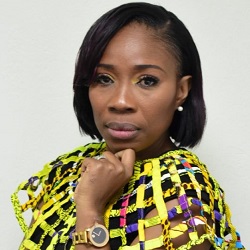
Where We Have Come From: Honouring Our Heritage

The event calendar showcases a diverse array of rich Caribbean traditions and exciting innovations, featuring the Opening Ceremony and Caribbean Street Parade, as well as the “Icon Nights” cultural legends concert. The Minister emphasised that the celebration will include activities for every Caribbean family.
Additional highlights will include the “Holy Train” – a spiritual sunrise gathering featuring dance, spoken word, and music; “Sunday Food” – a culinary experience highlighting the traditional flavours of Caribbean Sunday meals; and Heritage Exhibitions, featuring research presentations and interactive displays on Caribbean history and identity.
Where We Are: Celebrating Caribbean Excellence
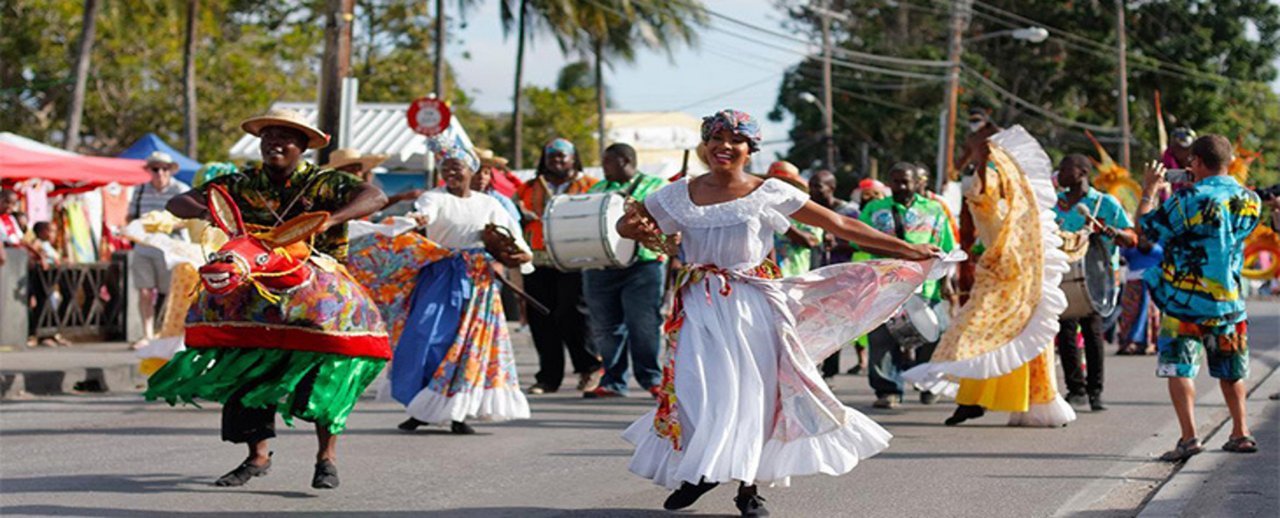
The activities within this pillar will showcase the Region’s vibrancy and talent through music, fashion, culinary arts, and literature. These events will highlight how the Caribbean continues to influence and inspire the world.
Activities include Country Nights, an immersive experience showcasing the unique artistic expressions of each participating nation; the Grand Market and Trade Hub, a dynamic space featuring art, craft, fashion, and culinary showcases; and a Film Festival and New Filmmakers Bootcamp, featuring screenings of acclaimed films and emerging talent from the Caribbean.
Visitors to Barbados during CARIFESTA XV will revel in the experience of Super Concerts, a series of concerts celebrating Caribbean musical pioneers and contemporary stars – as well as the “Pot Turn Down”, a street food festival that brings together diverse Caribbean flavours.
Where We Are Going: Building a Sustainable and Resilient Future

Minister Munro-Knight explained that this pillar will explore the resilience and adaptability of Caribbean culture in the face of global changes, including climate action, economic sustainability, and social progress.
“The discussions and events in this category will examine how we preserve and elevate Caribbean traditions while incorporating innovation and sustainability into our future,” the Minister stated.
The highlights will include “Big Conversations”, thought-provoking discussions on Caribbean identity, resilience, climate action, and cultural diplomacy; “Sustainability by the Sea”, a day dedicated to eco-friendly initiatives, including beach clean-ups and sustainable cuisine; and the CARIFESTA Business Forum, panel discussions and workshops on cultural entrepreneurship, licensing, and creative industries.
Additional attractions are The UWI Symposium, featuring academic discussions on the intersection of culture, technology, and sustainability, as well as a Wellness Day, which will explore traditional Caribbean wellness practices and herbal remedies.
Minister Munro-Knight underscored that the roster of activities was also designed for tourists. “CARIFESTA XV is an ideal experience for visitors from outside the Region to discover our rich culture,” asserted the Minister.
“CARIFESTA has been a cornerstone of regional unity and cultural celebration since its inception over fifty years ago. This year’s Festival takes place at a time when we in the Caribbean are facing several pressing challenges. Climate vulnerability, economic inequality, new technologies and social intolerance have all tested our resolve and threatened our way of life, as we know it. However, CARIFESTA remains the uniting event that reminds us of our innate resilience through our shared love of Caribbean culture,” she added.






Images courtesy of the National Cultural Foundation Barbados
]]>The Maroon Institute would lead a collaborative research, advocacy and policy agenda with the Maroon communities and be positioned as a regional and global centre for Indigenous and Maroon knowledge, culture and history.
“The UWI has a moral duty to facilitate not just resilience but the opportunity for the Jamaica Maroons to thrive, and that is exactly what we will do”, Professor Beckles said. “An Institute for Maroon Studies should be established… The most precious thing that ever came out of the Caribbean is the Maroons… Everywhere there was slavery, there was marronage. This University is an expression of marronage today.”
He further declared, “Everything we need to know about the future can be found in the study of our past.…. There can be no discussion about the future of this Region without the Maroons. Maroon philosophy, politics and ideology must be at the centre. We are all Maroons.”
“I have been looking forward to seeing Maroon Studies at The UWI, it is full time. It is in accordance with The UWI mission statement which includes uplifting culture, and the University should have Maroon people coming in to speak,” asserted Gaamaa Gloria Simms, Maroon Women’s Network Chair.
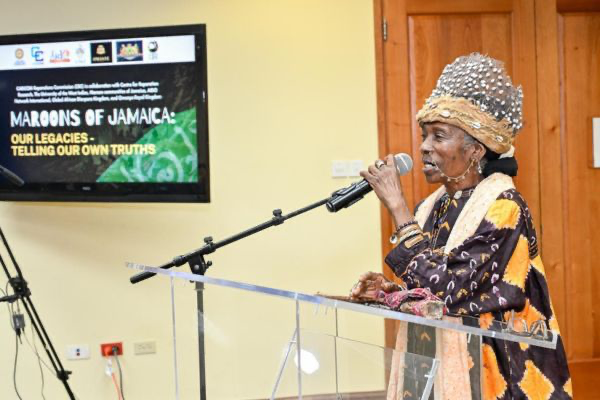
The Symposium was part of an initiative by the CARICOM Reparations Commission (CRC) to increase advocacy for reparatory justice and the rights of the Maroons and other indigenous groups. This was highlighted by Dr Hilary Brown, Programme Manager, Culture and Community Development, CARICOM Secretariat (who officially opened the proceedings). “The Maroons are among the indigenous people of the Region who are due reparatory justice and have a right to development. Their issues, concerns and rights must be respected and amplified within the regional movement for reparatory justice,” stated Dr Brown.
Maroon Chiefs and other representatives from the communities of Accompong, Mooretown, Flagstaff, Scotts Hall and Charles Town, as well as other experts, attended the Symposium, themed “The Maroons of Jamaica: Our Legacies, Telling Our Own Truths.”
Editor’s Notes:
Highlights:
The CARICOM Reparations Commission organised the event in collaboration with The UWI Centre for Reparation Research, the Maroon communities of Jamaica, AIDO Network International, the Global African Diaspora Kingdom and Omanye Royal Kingdom. It amplified the authentic voices of the Maroon Colonels and Chiefs, telling their historical stories and truths, dispelling myths and misconceptions and strengthening their unity and reconciliation efforts, which was on full display at the Symposium.
Symposium highlights included the Opening panel: “Maroon Treaties, Resistance, History & Culture: Dispelling Myths, Telling Our Truths,” which was moderated by Dr Hilary Brown. Panelists were: Chief Richard Currie (Paramount Chief aka Papa Odwe II, and Ambassador Anu El, Accompong); Mr. Bert Samuels (Attorney-at-Law, National Council on Reparations); Col. Wallace Sterling (Moore Town) and Colonel Lloyd Lattibeaudiere (Scott’s Hall).
The second panel entitled: “Maroon Legacies and Impact on Contemporary Jamaican and Caribbean Culture” was moderated by Dr Sonjah Stanley Niaah, Director, Centre for Reparation Research, The UWI. Panelists included Gaamaa Gloria Simms, Ms. Beverly Carey (Researcher | Author), Alex Moore-Minott (Myal priest) and Mr Sydney Bartley (Culture Expert | Consultant).
The closing roundtable was moderated by Dr Chenzira Davis Kahina, enstooled Queen Mother Hajila Adeke (AIDO | GADK | CPAN | CRC | UNIA ACL RC 2020) and entitled: “Jamaica and the Maroons: Inclusion, Collaboration and the Right to Development.” Participants included: Chief Richard Currie (Accompong); Colonel Wallace Sterling (Moore Town); Colonel Lloyd Lattibeaudiere (Scott’s Hall); Chief Kanute Cameron (Flagstaff), and Dr. Marcus Goffe (UWI / Legal Counsel of YCOIL/Charlestown). The panel focused on constitutional reform and advocated for inclusivity of the Maroons of Jamaica in all future proceedings and developments.
Mrs. Sharon Parris-Chambers, Publisher of Caribnewsroom Online News Journal, was chair of the proceedings.
Commitments
The Symposium ended on a high note with a commitment to commence work on establishing the Institute for Maroon and Indigenous Studies, which will be informed by the priorities identified by the Maroons in the Symposium. The Institute will have branches in the Maroon communities for collaboration and inclusivity. There was also a commitment to advancing the discussion on constitutional reform and the inclusivity of Indigenous people in the process.
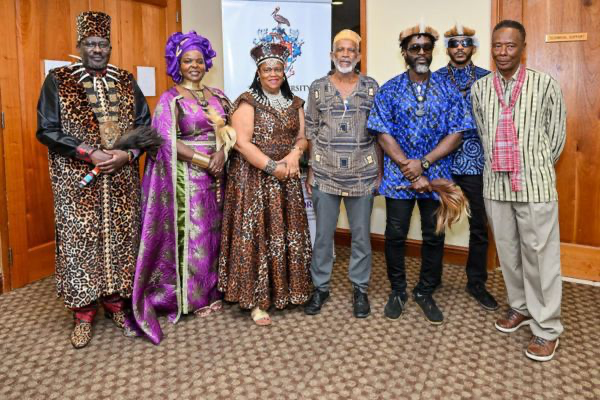
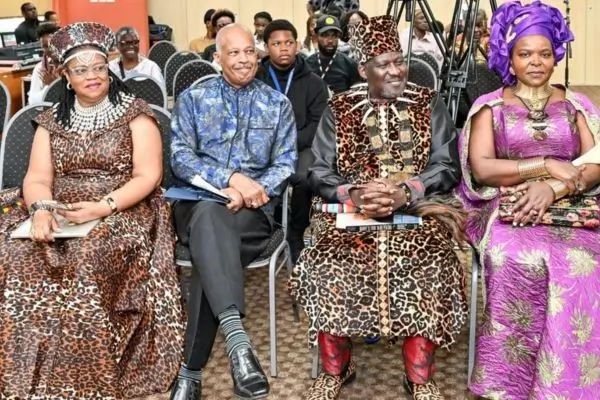
Helpful links:
CARICOM Welcomes Declaration of the Second Decade for People of African Descent
CARICOM Ten Point Plan for Reparatory Justice
CARICOM Reparations Commission (CRC)
“Meeting with Ambassador Comissiong was essential for aligning key priorities, including ensuring meaningful youth participation at the upcoming CARICOM Heads of Government Summit and advancing initiatives to engage young people across Barbados. This discussion provided an opportunity to strategise projects such as the proposed CARICOM Youth Workshop and outreach campaigns aimed at enhancing youth representation and increasing public awareness of CARICOM’s mission.”
CARICOM Youth Ambassador (Barbados) Ashley Lashley.Exploring ways to strengthen youth engagement within the CARICOM agenda was the focus of discussions between CARICOM Youth Ambassador (Barbados) Ashley Lashley and Barbados’ Ambassador to CARICOM, His Excellency Ambassador Comissiong, on Tuesday, 7 January.
They discussed priority areas for youth involvement in CARICOM, including agriculture and culture.
Increasing youth participation in upcoming CARICOM events, proposed workshops for secondary schools, and various outreach programmes across Barbados also formed part of the dialogue.
“Meeting with Ambassador Comissiong was essential for aligning key priorities, including ensuring meaningful youth participation at the upcoming CARICOM Heads of Government Summit and advancing initiatives to engage young people across Barbados. This discussion provided an opportunity to strategise on projects such as the proposed CARICOM Youth Workshop and outreach campaigns aimed at enhancing youth representation and increasing public awareness of CARICOM’s mission,” stated Ms Lashley.

2025 Priority Areas
The CARICOM Youth Ambassador highlighted her focus areas for 2025:
“For 2025, my priorities include increasing youth representation at CARICOM meetings, broadening public engagement through impactful outreach programmes, and supporting regional initiatives like the “CARICOM Ideal Citizen project”, with a particular focus on culture and agriculture. I am committed to amplifying youth voices in high-level discussions on critical regional challenges, such as sustainable development and collaborative progress,” stated Ms Lashley.
Anticipation for CARIFESTA XV
She also shared her anticipation for CARIFESTA XV, which will be hosted in Barbados from 22-31 August 2025:
]]>“As Barbados’ Female CARICOM Youth Ambassador, I eagerly anticipate CARIFESTA XV as a powerful celebration of Caribbean culture and resilience. This Festival represents a unique opportunity to unite the Region, highlight our extraordinary creative talents, and inspire the next generation to embrace and celebrate our shared identity. CARIFESTA should serve as a meaningful platform to engage Caribbean youth in preserving and promoting our cultural heritage while fostering spiritual and psychological resilience, and one I hope will remain a central focus of the event,” urged the CYA.
“As we would say in Barbados, “miss this and blame yourself”. Food and fashion, music and dance, art, craft, sculpture and good old Caribbean talk, from philosophy to attitudes, from religion to development. Let us use this as an opportunity to build resilience in our Region spiritually and psychologically. Let us gather and feed our souls and nurture our spirit as Caribbean people.”
CARICOM Chair, Hon. Mia Mottley
CARICOM Chair, Hon. Mia Amor Mottley, Prime Minister of Barbados, says CARIFESTA XV will be an ideal platform for the Region to build resilience through a celebration of the Community’s rich, diverse cultures.
The Prime Minister shared this in her New Year Statement as she invited the Region to the festival of arts to be hosted by Barbados from 22-31 August 2025. “I’m inviting you, God willing, to create, to participate and simply to come. I speak to each and every one of us as Caribbean people, not just as members of CARICOM, but every one of the Caribbean people that can hear my voice, come,” stated the Chair. She emphasised that the festival will be an occasion to “celebrate all that is good and is possible for our Caribbean civilisation, as we do what we do best in the expression of our Festival of Arts – CARIFESTA.”
The significance of the festival was also highlighted by the new Chair:
“As we would say in Barbados, “miss this and blame yourself”. Food and fashion, music and dance, art, craft, sculpture and good old Caribbean talk from philosophy to attitudes, from religion to development. Let us use this as an opportunity to build resilience in our Region spiritually and psychologically. Let us gather and feed our souls and nurture our spirit as Caribbean people,” she urged.
Planning for CARIFESTA XV is already in motion, with virtual meetings convened in September and November 2024 with the CARICOM Secretariat and officials from the Prime Minister’s Office and Division of Culture (Barbados).
In December 2024, an in-person meeting was held with stakeholders in Barbados. In attendance were Dr Hilary Brown, Programme Manager (Culture), CARICOM Secretariat; Michelle Maynard, Deputy Permanent Secretary, Ministry of Culture (Barbados); and officials from the Ministry of Foreign Affairs (Barbados) and the National Cultural Foundation, Barbados.
The theme, regional launch of the festival, the Host Country Agreement, establishment of the host country management committee and regional technical support team were critical aspects of the discussion. The festival’s logistics, programme details and the marketing and communication approaches also formed part of the agenda.
“Our priorities are the visibility of the festival, ensuring that our artists realise benefits from participating, and that Caribbean people and international visitors have all the requisite information to enjoy all aspects of the events,” stated Dr Hilary Brown. She reiterated the CARICOM Secretariat’s support to the planning and execution of CARIFESTA XV.

The last CARIFESTA was held in Trinidad and Tobago in 2019.



For more on the history of CARIFESTA, click here.
]]>